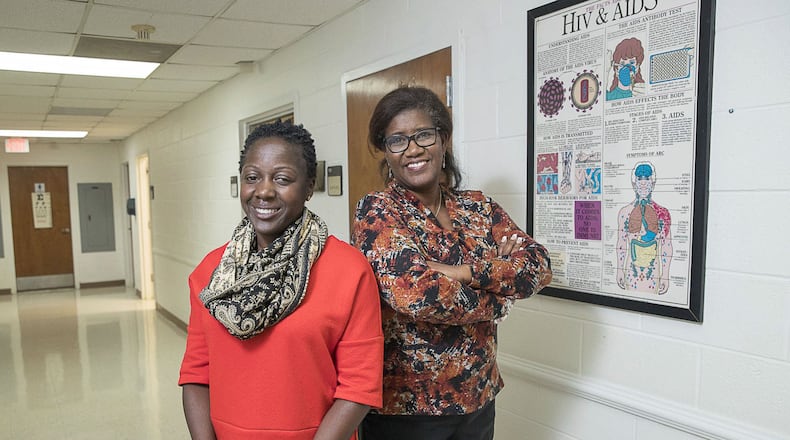Even without a vaccine, experts have been saying for years that HIV transmission could soon end in this country, and it could happen not just in a generation but in the span of just a few years.
As someone who has been reporting on HIV rates since I arrived in Atlanta 18 years ago, I hadn’t put much stock in their predictions.
For one thing, African-Americans have been disproportionately affected by HIV/AIDS since the epidemic’s beginning, and that disparity has deepened over time. For another, blacks represent only 12 percent of the U.S. population but accounted for 43 percent of new HIV diagnoses in 2016. Add that to the fact that black women, youth, and gay and bisexual men have had especially alarming infection rates.
The silver lining in all this is the fact that today’s potent antiretroviral drugs drive down the amount of virus in an HIV-infected person’s system to undetectable levels. In my estimation, if you pair that with PrEP or pre-exposure prophylaxis, you have the makings of a miracle.
Taken correctly, doctors say PrEP reduces the risk of contracting HIV from an infected partner by 95 percent. If the infected partner is virally suppressed, the risk is even lower.
RELATED |Stigma still fueling rising rate of HIV among blacks
Despite it being around since at least 2012, I first heard about PrEP last year while reporting on high rates of HIV infection in black gay men. What’s troubling is some people, including doctors, either aren’t aware of the HIV (prophylaxis) medication or don’t have access to it.
Recently, however, I happened upon a bit of news that gave me hope.
The Student Health Center at Morehouse College, thanks to funds and training from Fulton County and Kaiser Permanente of Georgia, is now offering PrEP.
Here’s why that’s so important.
In 2016, African-American teens and young adults, ages 13-24, represented more than half — 54 percent — of new HIV diagnoses in that age group; the majority were young gay and bisexual men.
Currently, half of young black men who have sex with men are expected to become HIV positive in their lifetimes. And some could also infect women in their lives.
Cynthia Trawick, administrative director at the Morehouse College Student Health Center, said the end goal is to be able to provide students who are interested in taking PrEP, the opportunity to do that and thus stop the spread of HIV.
Some students visiting the clinic have already requested PrEP, Trawick said. Having the prevention tool available also allows the health center to dispel myths about PrEP among students, including the drug is only for gay men.
Morehouse is said to be the first HBCU—historically black colleges and universities — in the country to offer the preventive medicine, but efforts are underway to expand the project to other Atlanta colleges.
RELATED | HIV quarantine? No. Better access to health care? Yes, by all means
Trawick said that student surveys revealed students wanted more health information, including the HIV epidemic and its impact on both physical and sexual health.
To take advantage of PrEP, she said, students must first submit to an HIV test, month blood analysis to make sure there are no adverse effects, and be willing to adhere to strict guidelines for taking the medicine — a pill day for as long as they want to prevent contracting HIV based on exposure — at a cost of $1,500 a month.
“We make it our business to make sure our students are doing OK,” Trawick said.
Before launching the project at the start of the school year, she said the majority of students were like me. They weren’t aware PrEP was even an option. Now, they are the project’s best ambassadors.
“There was a time when kids wouldn’t even come into the clinic,” Trawick said. “Not only are they taking control of their own health now, but they’re also telling other students and asking us to help them with testing events.”
Credit: The Atlanta Journal-Constitution
Credit: The Atlanta Journal-Constitution
It helps that Trawick’s team take great strides to tamp down the stigma still associated with HIV/AIDS. For instance, when they first launched the project, testing was done at 7 p.m. every Wednesday. Now students can come in any time to be tested.
RELATED | The silent epidemic: Black gay men and HIV
“We don’t want it to be seen as a negative to get tested,” Trawick said. “You should know your status, and you should know your partner’s status so we do whatever we can to make it a normal part of life.”
Sinead Younge, associate professor of psychology at Morehouse College, said the HBCU has been tracking student’s sexual behavior at least since 2005.
Adding PrEP to its arsenal of prevention was very exciting, she said.
“There is no magic barrier between our institution and the city, anything that impacts the general population of black males impacts the student population,” Younge said. “Because we have this captive audience, we have a real opportunity to make sure they are as healthy as they can be, regardless of their STI or HIV status.”
Younge said that because Morehouse students hail from all over the country, their level of sex education varies.
“We can’t assume they have the same knowledge and a lot of the information that they get is from the internet,” she said. “It makes one pause because the internet isn’t always accurate.”
Based on their experience with students thus far, Younge said it’s very apparent students are hungry for information, that they want to hear from faculty and staff, and have serious conversations about their health.
Maybe the experts are right. Maybe the end to HIV really is near and HBCUs like Morehouse can be at the forefront of the fight in the black community.
> RELATED: Why women need to be blunt in asking about their man's sex life
Find Gracie on Facebook (www.facebook.com/graciestaplesajc/) and Twitter (@GStaples_AJC) or email her at gstaples@ajc.com.
World AIDS DAY
Noon to 4 p.m. Nov 28. Forbes Arena, Morehouse College, 830 Westview Dr SW; Atlanta, Georgia 30314.
About the Author
Keep Reading
The Latest
Featured





